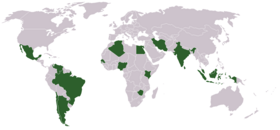Loading AI tools
Informal forum From Wikipedia, the free encyclopedia
The Group of 15 (G-15)[1] is an informal forum set up to foster cooperation and provide input for other international groups, such as the World Trade Organization (WTO) and the Group of Seven. It was established at the Ninth Non-Aligned Movement Summit Meeting in Belgrade, Yugoslavia, in September 1989, and is composed of countries from Latin America, Africa, and Asia with a common goal of enhanced growth and prosperity. The G-15 focuses on cooperation among developing countries in the areas of investment, trade, and technology. Chile, Iran and Kenya have since joined the Group of 15, whereas Yugoslavia is no longer part of the group, and Peru, a founding member-state, decided to leave the G-15 in 2011. Membership thus has since expanded to 17 countries, but the forum's name remains unchanged.[3]
 Members of G-15 [1] | |
| Formation | September 1989 1990 (Summit) |
|---|---|
| Purpose | Act as a catalyst for greater cooperation between leading developing countries.[2] |
| Location | |
Membership | |
G-15 Chair | |
| Website | www.g15.org |
Some of the objectives of the G-15 are:
By design, the G-15 has avoided establishing an administrative structure like those for international organizations, such as the United Nations or the World Bank; but the G-15 does have a Technical Support Facility (TSF) located in Geneva. The TSF functions under the direction of the Chairman for the current year. The TSF provides necessary support for the activities of the G-15 and for its objectives.[5] Other organs and functions of the G-15 include:
In addition, the Federation of Chambers of Commerce, Industry and Services (FCCIS) is a private sector forum of G-15 member countries. The purpose of the FCCIS is to coordinate and maximize efforts which promote business, economic development and joint investment in G-15 nations.[5]
In 2010, the chairmanship of the G-15 was accepted by Sri Lanka at the conclusion of the 14th G-15 summit in Tehran.[6]
World Economic Outlook database (2012)[7]
| Date | Host country | Host city | Host | |
|---|---|---|---|---|
| 1st G-15 summit | 1–3 June 1990 | Malaysia | Kuala Lumpur | Mahathir Mohamad |
| 2nd G-15 summit | 27–29 November 1991 | Venezuela | Caracas | Carlos Andrés Pérez |
| 3rd G-15 summit | 21–23 November 1992 | Senegal | Dakar | Abdou Diouf |
| 4th G-15 summit | 1994 | India | New Delhi | P. V. Narasimha Rao |
| 5th G-15 summit | 5–7 November 1995 | Argentina | Buenos Aires | Carlos Menem |
| 6th G-15 summit | 3–5 November 1996 | Zimbabwe | Harare | Robert Mugabe |
| 7th G-15 summit | 28 October – 5 November 1997 | Malaysia | Kuala Lumpur | Mahathir Mohamad |
| 8th G-15 summit | 11–13 May 1998 | Egypt | Cairo | Hosni Mubarak |
| 9th G-15 summit | 10–12 February 1999 | Jamaica | Montego Bay | P. J. Patterson |
| 10th G-15 summit | 19–20 June 2000 | Egypt | Cairo | Hosni Mubarak |
| 11th G-15 summit | 30–31 May 2001 | Indonesia | Jakarta | Abdurrahman Wahid |
| 12th G-15 summit | 27–28 February 2004 | Venezuela | Caracas | Hugo Chávez |
| 13th G-15 summit | 14 September 2006 | Cuba | Havana | Raúl Castro |
| 14th G-15 summit | 17 May 2010 | Iran | Tehran | Mahmoud Ahmadinejad |
| 15th G-15 summit | 2012 | Sri Lanka | Colombo | Mahinda Rajapaksa |
Seamless Wikipedia browsing. On steroids.
Every time you click a link to Wikipedia, Wiktionary or Wikiquote in your browser's search results, it will show the modern Wikiwand interface.
Wikiwand extension is a five stars, simple, with minimum permission required to keep your browsing private, safe and transparent.